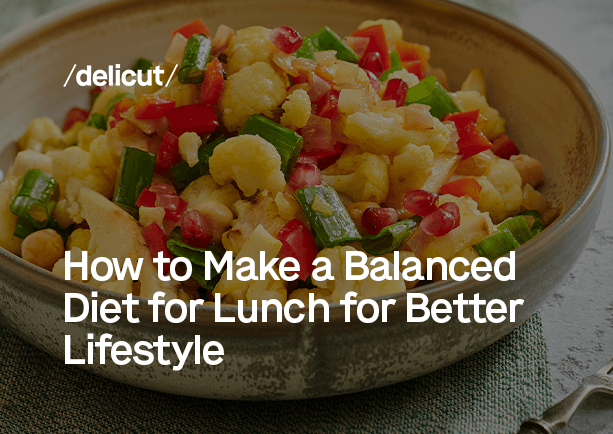How to Make a Balanced Diet for Lunch for Better Lifestyle

Lunch is a crucial meal that fuels our bodies and minds, providing the energy needed to tackle the rest of the day. But finding the right balance of nutrients can sometimes feel like a culinary puzzle. We are here to guide you through the art of crafting a satisfying and nourishing lunch that promotes well-being, supports weight management, and boosts overall vitality.
So, let's dig into essential ingredients, insightful tips, and expert advice to create lunches that will leave you feeling energized, fulfilled, and ready to conquer anything that comes your way!
What is a Balanced Diet for Lunch?
A balanced diet lunch is a meal that includes a variety of nutrients in appropriate proportions to support overall health and well-being. It typically consists of a combination of protein, carbohydrates, healthy fats, fiber, and essential vitamins and minerals. Including a colorful array of fruits and vegetables, lean proteins, whole grains, and plant-based fats in your lunch can help you meet your nutritional needs and maintain a healthy lifestyle.
Importance of a Balanced Diet for Lunch
A balanced diet lunch is of utmost importance as it significantly supports overall health and well-being. A well-balanced meal ensures that your body receives essential nutrients, vitamins, and minerals necessary for optimal functioning. A balanced lunch provides sustained energy levels, helps regulate blood sugar, and prevents energy crashes later in the day.
Additionally, it promotes a healthy weight by providing the right combination of nutrients and controlling portion sizes. Eating a balanced lunch also aids in better digestion, supports a strong immune system, and enhances cognitive function.
By making mindful choices and incorporating a diverse range of nutrient-rich foods, you can harness the power of a balanced lunch to achieve a healthier and more vibrant lifestyle.
How Can You Make a Balanced Diet for Lunch?
Creating a balanced lunch diet involves incorporating various nutrient-rich foods from different food groups. Here are some key steps to achieve a balanced lunch:
Include a Protein Source
A protein source in your balanced diet for lunch is essential for maintaining energy levels, promoting satiety, and supporting overall health. There are various options for protein-rich foods catering to different dietary preferences.
For non-vegetarians, lean meats like grilled chicken, turkey, or fish are excellent choices. Vegetarians can opt for tofu, tempeh, beans, lentils, or chickpeas as plant-based protein sources.
Greek yogurt, cottage cheese, and eggs are also great protein options for a balanced lunch. Adding protein to your midday meal will keep you feeling full and aid in muscle repair and recovery.
Add Whole Grains
Incorporating whole grains into your lunch is a fantastic way to boost nutrition and sustain energy throughout the day. Whole grains provide essential nutrients like fiber, vitamins, and minerals that contribute to a balanced diet. Opt for whole-grain bread, brown rice, quinoa, bulgur, or whole-wheat pasta to complement your lunch.
These grains help regulate blood sugar levels, support digestive health and promote a feeling of fullness. Additionally, the complex carbohydrates in whole grains release energy gradually, keeping you energized and focused throughout the afternoon.
Load Up on Vegetables
Piling your lunch with various colorful and nutrient-rich vegetables is key to creating a balanced diet. Vegetables offer an abundance of vitamins, minerals, antioxidants, and dietary fiber essential for optimal health. Incorporate leafy greens like spinach, kale, or arugula, along with other vegetables like carrots, bell peppers, cucumbers, and tomatoes.
You can enjoy them raw in a salad, sautéed, or roasted for added flavor. Vegetables provide vital nutrients and contribute to a feeling of fullness without adding excessive calories.
Don't Forget Healthy Fats
Healthy fats, such as those found in avocados, nuts, seeds, and olive oil, are a valuable energy source and support various bodily functions. They also aid in the absorption of fat-soluble vitamins, like A, D, E, and K. Adding sliced avocado to your salad, sprinkling nuts and seeds on top, or drizzling olive oil over your vegetables are great ways to incorporate healthy fats into your lunch.
Not only do they enhance the taste and texture of your meal, but they also keep you feeling satisfied and help regulate blood sugar levels. Remember that moderation is key, as healthy fats, though beneficial, are calorie-dense.
Control Portion Sizes
Even when including nutritious foods, consuming excessive portions can lead to overeating and disrupt the balance of your meal. Be mindful of serving sizes for each food group to avoid consuming more calories than needed. A general guideline is to fill half your plate with vegetables, a quarter with protein, and the remaining quarter with whole grains.
Using smaller plates and bowls can also help you manage portion sizes effectively. Additionally, take the time to eat slowly and savor each bite, as this allows your body to recognize when it's full and prevents overindulgence.
Limit Processed Foods
To achieve a truly balanced diet for lunch, it's essential to limit the intake of processed foods. These items often contain high amounts of added sugars, unhealthy fats, and sodium, which can negatively affect your health.
Instead, focus on whole, minimally processed foods rich in nutrients and natural flavors. Opt for fresh fruits, vegetables, lean proteins, whole grains, and healthy fats.
By minimizing processed foods in your lunch, you'll maintain a healthier diet and reduce the risk of various chronic health conditions. Preparing homemade meals and snacks allows you to have better control over the ingredients and ensures that your lunch is truly nourishing and balanced.
Stay Hydrated
In the quest for a well-balanced lunch, it's crucial to remember the importance of staying hydrated. Adequate water intake is essential for overall health. It can have a significant impact on how we feel throughout the day.
Hydration helps regulate body temperature, supports digestion, and aids nutrient absorption. Incorporate water-rich foods like cucumbers, watermelon, and celery into your lunch. Additionally, consider having a refreshing glass of water alongside your meal.
In Conclusion
Crafting a balanced diet for lunch is a powerful way to elevate your overall lifestyle and well-being. By incorporating various nutrient-dense foods, including protein sources, whole grains, vegetables, and healthy fats, you're providing your body with the fuel it needs to thrive. Remember to control portion sizes and limit processed foods to maintain balance and promote better health.
Embrace the opportunity to explore new flavors, experiment with wholesome ingredients, and create delicious lunches that nourish body and mind. With a little planning and creativity, you can embark on a wellness journey and discover the joy of a balanced lunch that sets the tone for a vibrant and fulfilling lifestyle.
FAQs
1. What does it mean to have a balanced lunch, and why is it important for overall health and well-being?
Having a balanced lunch means consuming a meal that includes a variety of nutrients in appropriate proportions to meet the body's nutritional needs. A balanced lunch typically consists of a protein source, whole grains, plenty of vegetables, and healthy fats. It is important for overall health and well-being because it provides the body with essential nutrients, supports energy levels, and aids in maintaining a healthy weight.
A balanced lunch can also help stabilize blood sugar levels, enhance cognitive function, and support digestive health. By choosing nutrient-dense foods and avoiding excessive processed ingredients, a balanced lunch contributes to a healthier lifestyle, promotes optimal body functions, and increases the likelihood of maintaining a well-rounded diet throughout the day.
2. How can I make my balanced lunch more flavorful and enjoyable to eat?
To make your balanced lunch more flavorful and enjoyable, you can experiment with a variety of herbs, spices, and condiments to enhance the taste of your dishes. Incorporate fresh herbs like basil, cilantro, or rosemary, and use spices such as cumin, paprika, or turmeric to add depth and complexity to your meals. Don't shy away from incorporating healthy sauces or dressings like balsamic vinaigrette, tahini, or salsa to bring unique flavors to your dishes.
Additionally, you can include a mix of textures and flavors by combining crunchy vegetables, creamy avocados, and tangy fruits. Exploring different cuisines and trying new recipes can also keep your lunch exciting and prevent food monotony.
3. Are there specific guidelines or ratios to follow when creating a balanced lunch?
While there isn't a one-size-fits-all guideline for creating a balanced lunch, a general rule of thumb is to include a variety of food groups in your meal. Aim to fill half your plate with vegetables and fruits, one-quarter with a lean protein source like chicken, fish, tofu, or beans, and the remaining quarter with whole grains like quinoa, brown rice, or whole wheat bread.
Don't forget to add a small portion of healthy fats from sources like avocado, nuts, or olive oil. This approach ensures you're getting a mix of nutrients, fiber, and energy to sustain you throughout the day. It's also essential to pay attention to portion sizes and listen to your body's hunger and fullness cues to maintain a balanced and satisfying lunch.
4. What are some strategies for incorporating more fruits and vegetables into a balanced lunch?
Start by adding a variety of colorful veggies to your salads, wraps, or sandwiches. You can also include raw veggies with a hummus or yogurt dip for a crunchy and nutritious side. Experiment with different cooking methods like roasting, steaming, or grilling to enhance flavors and textures. Add fruits to your lunch by topping your yogurt with berries, including slices of apple or pear in salads, or enjoying a fruit salad as a refreshing side.
Additionally, consider blending veggies and fruits into smoothies or soups for a quick and convenient way to get your daily intake. By making fruits and vegetables a prominent part of your lunch routine, you'll enhance the nutritional value and enjoy a more flavorful and satisfying meal.
Read More:
23 Healthy Dinners for Weight Loss | Delicut
How to Create a Balanced and Nutritious Plate for Every Meal
Related Blogs
The Burnout Diet
Jan 30, 2026 | 8The mental load of “What should I eat today?"
Jan 22, 2026 | 8The real glow-up starts with your gut health
Jan 14, 2026 | 8Healthy food that doesn’t taste like “Diet Food”
Jan 17, 2026 | 8Why do most people in the UAE get their calories wrong
Dec 8, 2025 | 6DASH Diet Meal Plan
Nov 11, 2025 | 8Fatty Liver Meal Plan
Oct 31, 2025 | 8Pregnancy Diet Meal Plan
Oct 27, 2025 | 82000 Calorie Meal Plan
Oct 1, 2025 | 8Intermittent Fasting Diet Plan
Sep 5, 2025 | 8






